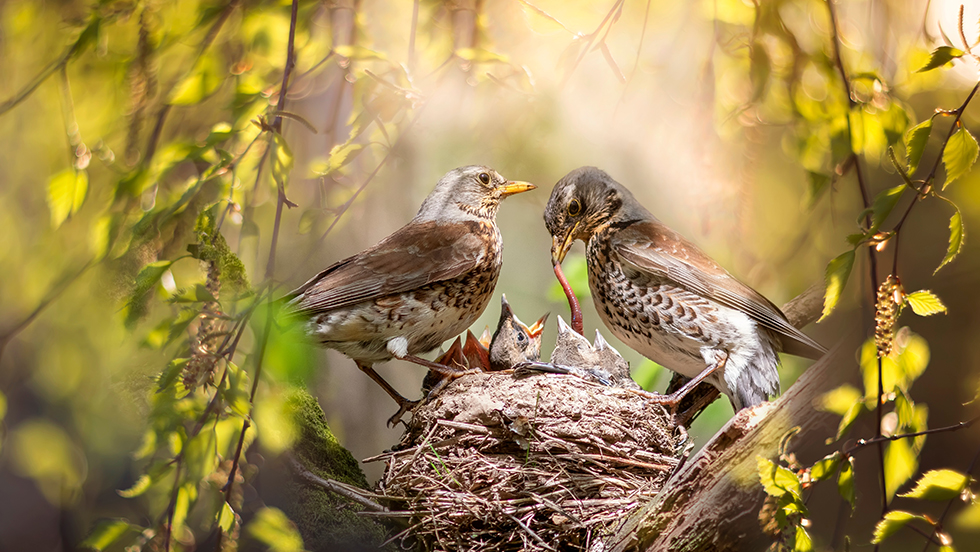
How do birds make parenting decisions? An Adelphi faculty member is conducting fascinating research to understand the complexities of the avian parent and child relationship.
Bird brains may be tiny, but according to Shana Caro, PhD, assistant professor in the Adelphi University Department of Biology, they’re anything but simple. In fact, bird cognition is incredibly complex—much more so than most experts previously believed.
Dr. Caro, who studied human evolutionary biology at Harvard University before pivoting to zoology and animal biology at the University of Oxford for her doctorate, has spent most of her career researching the dynamics between bird parents and their offspring, integrating concepts from behavioral neuroscience, evolutionary biology and urban biology. “I’m interested in how birds’ social behavior evolves when there’s a tension between two evolutionary incentives: cooperation and competition,” she said.
Bird families are the perfect petri dish for this tension. Parents want their offspring to cooperate and survive, but they may also, as Dr. Caro puts it, “be a little selfish and want their partner to do more of the work.”
Publishing Research That Expands Understanding of Bird Behavior
Recently, Dr. Caro was the first author on an article, “Parental control: ecology drives plasticity in parental response to offspring signals” (Behavioral Ecology, May 2025), that adds a new dimension to our understanding of bird parent behavior. Among evolutionary biologists, conventional wisdom holds that bird parents respond to their offspring begging for food with fixed behaviors, or behaviors that have evolved over time into something specific and unchanging. But Dr. Caro suspected that parents are actually plastic, or flexible, when responding to their offspring’s signals, particularly in different environmental conditions.
Dr. Caro took to the woods to conduct an experiment. She gave half of the resident bird population extra food to simulate ideal environmental conditions. The other half experienced no change to their environments. Additionally, she cross-fostered broods to ensure that chicks in both populations would behave similarly, leaving environmental conditions the only remaining variable.
Over the subsequent week, parents did not concentrate their feeding on the chicks that were the largest or loudest. Instead, Dr. Caro’s theory proved correct. The parents who received extra food became “nice, equitable parents,” she explained, while parents in harsher conditions surrendered to survival of the fittest. “These parents selectively ignored the runts, which means they were making decisions about which of their offspring were most likely to survive when food was low.” Ultimately, parents displayed plasticity in responding to multiple sources of information, including local environmental conditions and their assessments of each chick’s size and behavior.
Exploring Parenting Differences Between Males and Females
Dr. Caro’s “Sex differences in parental response to offspring begging are associated with pair bond strength across birds” (Behaviour, July 2025) illuminates another bird family dynamic—this time couples. “In my work, I was noticing that male and female parents made decisions differently. Mothers took longer to make a decision and were more likely to change their minds,” often clashing with fathers over feeding. But, she wondered, were these conflicts purely the product of biological differences in birds?
To find out, she conducted a meta-analysis on 31 bird species, comparing how mothers and fathers responded to offspring begging alongside social and physiological traits that could influence conflict. The results were unexpected. “I went in expecting birds to show similar patterns to mammals, where females are almost always more responsive and provide the vast majority of parental care,” she said. “But across every bird species, sex difference was minimal. Only when I looked within species did I start to see other patterns.”
In bird species with strong bonds between males and females, fathers were more responsive to offspring begging for food. In species with less stable bonds, however, fathers were less responsive to begging, leading females to compensate by taking on a greater share of parental care. Rather than an innate difference among sexes, then, Dr. Caro’s findings demonstrate that varying levels of responsiveness among males and females are likely shaped by the types of bonds they form.
Whether she’s depositing mealworms in bird nests or running statistical analyses, Dr. Caro believes a mixture of research methods will always yield the best result. “Comparative meta-analyses allow me to see the big picture across species. Then I can zoom into the details with experimental work,” she said. “My findings from an experiment might lead me to do a meta-analysis or vice versa. This is just such a rich field with so many different axes to explore.”